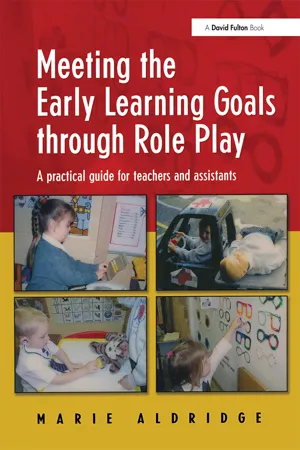
Meeting the Early Learning Goals Through Role Play
A Practical Guide for Teachers and Assistants
Marie Aldridge
- 196 pagine
- English
- ePUB (disponibile sull'app)
- Disponibile su iOS e Android
Meeting the Early Learning Goals Through Role Play
A Practical Guide for Teachers and Assistants
Marie Aldridge
Informazioni sul libro
This book offers step-by-step guidance to help busy practitioners create meaningful role play that will delight young children, enhance learning and link to the Early Learning Goals. The role play scenarios have been carefully created so that children can identify with them and will be excited and eager to join in. They give children the opportunity to play freely, to discover and develop at their own pace and to link directly to the Early Learning Goals and beyond. This Book shows practitioners exactly how to plan, organize and implement role play activities. The activities have been tried, tested and enjoyed in the busy nursery where the author works. The book also divides the play scenarios into the DfES stated area of learning (personal, social, emotional, communication, language and literacy, mathematical, knowledge of the world, creative and physical) allowing practitioners to choose activities to suit their needs. The book includes: step-by-step guidance; photographs and plans; a list of easily obtained and inexpensive play equipment; and a planning template for practitioners to develop their own ideas. It should prove useful to teachers and assistants from nursery classes up to key stage 1.
Domande frequenti
Informazioni
Transport and Journeys
Road, rail and air
Play situation
Possible roles
Resources
Potential learning opportunities
Personal, social and emotional development
- explore a new learning environment involved with transport projects with imagination, creativity, confidence, humour and persistence;
- initiate play, building on their own experiences of travel; begin to take a lead in the play and organise others;
- discuss their own play journeys with peers and adults confidently;
- improve their confidence and begin to develop and be proud of their own personality;
- express feelings and be sensitive to the needs of others;
- work cooperatively within a small group, showing respect, interest and care for others;
- share the role-play resources and space, take turns fairly, form queues and be polite;
- explore the need for their own simple rules within the area for safety reasons;
- play independently within the role-play area: buying tickets, finding seats, dealing with baggage and enjoying the journey;
- select appropriate equipment for a task and use it sensibly and feel confident to ask for advice and help from peers and supporting adults if problems arise or equipment is not available;
- improve their dressing skills by tackling various types of clothes and fastenings when wearing costumes;
- be aware of the different transport systems that operate in their own local area and further afield;
- understand how transport systems have changed with time.
Communication, language and literacy
- speak clearly and use appropriate body language to get attention, defend their own interests and to be understood by friends and family;
- develop questioning techniques (how, when, where and why) about where vehicles are travelling, how much the journey costs and the times involved; begin to use language as a means of communicating: giving simple
- instructions, explaining routes and directions, asking for help, expressing opinions and responding to aural stimuli from telephones, passengers' requests, computers and other equipment;
- share with the group what they have achieved through play;
- develop a need to read and awareness of environmental print: posters, leaflets, tickets, maps, brochures, magazines and timetables;
- listen with interest to and read a selection of stories and non-fiction books, magazines and other class-made reading material about relevant transport and travel topics;
- retell some of the stories using drama as a tool remembering the main characters, sequence of events and key rhymes and chants;
- create real life stories which can be recorded in a format that the children choose: video, photograph, tape, picture or writing;
- develop their confidence and enjoyment of being able to write by experimenting with mark-making tools in the role-play area and writing their own and their friends' names on play documents;
- write using emergent, symbolic and conventional letter forms, postcards from various destinations, posters, leaflets and other advertising material using travel brochures and magazines to develop them;
- make zig-zag books to capture different stages of the children's imaginary journey.
Mathematical development
- record information about the number of travellers on a given journey in pictorial and numerical forms (Which were the most popular seats and why? Which was the most popular destination?);
- sort and match tools used by mechanics according to shape, size and colour and place them in appropriately labelled boxes and on shelves;
- match one seat on a vehicle to one child with a correctly numbered, coloured or shaped ticket;
- reco...
Indice dei contenuti
- Cover
- Title
- Copyright
- Contents
- Acknowledgements
- Introduction
- House
- Health care
- Shops and services
- Transport and journeys
- Appendix: Tina Bruce's 12 features of play
- Recommended reading
- Bibliography